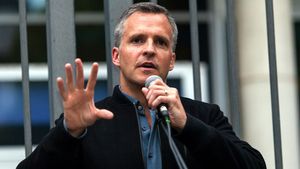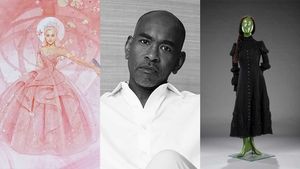When I came out to my mother, I think she was afraid for me and for herself. She said, "I've lost so many friends, I've had to replace my address book." That was 3 years after her best friend Manuel died in a hospital. He'd refused to let her enter his room. Manuel was a really fit 50-something, a professional dancer, and he and my mother worked out together at the gym and also danced together in competitions. He didn't want her to see him so wasted by AIDS. That was before the drug cocktails, the ones that could have saved him. And then he died. What a gift then to have a gay son, but then what worry to think he might go through something similar.
A few friends around my age have posted about today, World AIDS Day. Some of us are in a funny spot: too young to have seen the epidemic firsthand when it started, too old to have escaped its wake, before medication miraculously saved so many of us.
Today, if you're worried about contracting HIV, a medication, PrEP, can prevent it -- even more effectively than condoms. If you're living with HIV, maintaining an undetectable viral load for 6 months means you no longer have to worry about transmitting the virus. It's possible now to live with HIV, both figuratively in your mind and literally in your body, with so much less fear. Not nearly enough people have access to these medications, but they exist. By that fact, so many more people continue to exist too.
My doctor sees mostly men living with HIV, so I've at times sat in the waiting room thinking what it must have looked like 20 years ago. When I saw him this fall for an annual, he'd switched exam rooms. He moved from one side of the hall to the other side. I asked why. He said, "I sat at my desk one day and realized, I've been in this same room for over 20 years. And I noticed that with my younger patients, I felt resentful as I prescribed them PrEP. I want them to have the life that so many of my other patients didn't get to have. But there were ghosts in that room. Nearly twenty years of ghosts. And they were weighing on me. So I moved across the hall. It's done me a world of good."
A small shift, but not inconsequential.
I imagine the ghosts are still with my doctor, just as Manuel is still with me and with my mother. I still have a lacquered banana leaf box he gave me after coming back from Nicaragua one year. I remember wearing a pair of his old shoes. And I still remember what my mother feared that day, when I came out. But what a gift to experience this life, to be alive and able to remember these things. Sometimes people who've passed away feel very distant, but then I remember a conversation. For example, Pete coming up to me after a training, to share a moment. He was such a gentle person. Or Yvonne on a car ride to Sacramento. We talked about forgiveness, and she still becomes so vivid, I can nearly see the light of the sun reflect off her glasses, moving as we continue our drive. What a memorable group of people, and just a fraction of the millions who could be remembered. What a gift to remember them each year, with so much more time before becoming one of the ones to be remembered. Much more time than my mother feared, and with so much less fear myself.
Bryan Kutner has worked in public health for over 15 years, first helping to launch the Harm Reduction Coalition's Oakland training calendar, then offering case management services for people living in supportive housing. In 2001, he began training for the University of California San Francisco AIDS Health Project, traveling throughout the state to facilitate workshops for HIV service providers and to collaborate with the California Department of Public Health on policies and procedures related to HIV counseling and testing. Bryan continues to consult with a handful of domestic and global NGOs to develop training programs for mental health, supportive housing, sexual health, and HIV prevention projects. He earned an MPH in Epidemiology from Columbia University, is nearing completion of a PhD in Clinical Psychology from the University of Washington, and is a member of the Motivational Interviewing Network of Trainers, a group dedicated to the dissemination and implementation of evidence-based practice.
















































































